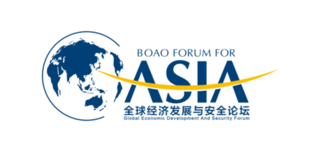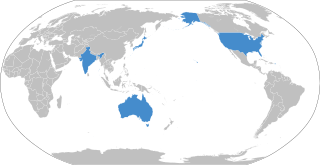The politics of the People's Republic of China takes place in a framework of a unitary Marxist–Leninist one-party socialist state under the Chinese Communist Party (CCP). The Chinese political system is authoritarian. There are no freely elected national leaders, political opposition is suppressed, all religious activity is controlled by the CCP, dissent is not permitted, and civil rights are curtailed. Direct elections occur only at the local level, not the national level, with all candidate nominations controlled by the CCP.

China, officially the People's Republic of China (PRC), has full diplomatic relations with 179 out of the other 193 United Nations member states, Cook Islands, Niue and the State of Palestine. China has had the most diplomatic missions of any state.

Kevin Michael Rudd is an Australian diplomat and former politician who served as the 26th prime minister of Australia, from 2007 to 2010 and June 2013 to September 2013, holding office as the leader of the Australian Labor Party (ALP). Rudd is the 23rd and current ambassador of Australia to the United States since 2023.

The Boao Forum for Asia, initiated by 25 Asian countries and Australia, is a non-profit organisation that hosts high-level forums for leaders from government, business and academia in Asia and other continents to share their vision on the most pressing issues in this region and the world at large. BFA is modelled on the World Economic Forum held annually in Davos, Switzerland. Its fixed address is in Bo'ao, Hainan province, China, although the Secretariat is based in Beijing. The forum, sometimes known as the “Asian Davos”, takes its name from the town of Boao, located in China's southern Hainan province, which has been the permanent venue for its annual conference since 2002.

Xi Jinping is a Chinese politician who has been serving as the general secretary of the Chinese Communist Party (CCP) and chairman of the Central Military Commission (CMC), and thus as the paramount leader of China, since 2012. Xi has also served as the president of the People's Republic of China (PRC) since 2013. He belongs to the fifth generation of Chinese leadership.

ThePeople's Liberation Army National Defence University is a national public collegiate military university headquartered in Beijing, China with constituent and affiliated military academies nationwide. Established in 1985 by a military order of Deng Xiaoping, the university is under the "institutional leadership" of the Central Military Commission. The university is the highest military education institution of China.

Consular relations between China and Australia were first established in 1909, and diplomatic relations were established in 1941. Australia continued to recognise the Republic of China (ROC) government after it lost the Chinese Civil War and retreated to Taiwan in 1949, but switched recognition to the People's Republic of China (PRC) on 21 December 1972. The relationship between China and Australia has grown considerably over the years. Both countries are actively engaged economically, culturally and politically which spans numerous organisations such as APEC, East Asia Summit and the G20. China is Australia's largest trading partner, and has invested in Australian mining companies.

China–Syria relations are foreign relations between China and Syria. The nationalist government of China recognized Syria in 1946. Diplomatic relations between both countries were established on August 1, 1956. China has an embassy in Damascus and Syria has an embassy in Beijing, the two governments generally maintaining a friendly political and economic relationship for the last several decades, which continues to endure despite the Syrian civil war.

China–Palestine relations, also referred to as Sino–Palestinian relations, encompasses the long bilateral relationship between China and Palestine dating back from the early years of the Cold War.

The Quadrilateral Security Dialogue (QSD), commonly known as the Quad, is a strategic security dialogue between Australia, India, Japan and the United States that is maintained by talks between member countries. The dialogue was initiated in 2007 by Japanese Prime Minister Shinzo Abe, with the support of Australian Prime Minister John Howard, Indian Prime Minister Manmohan Singh and U.S. Vice President Dick Cheney. The dialogue was paralleled by joint military exercises of an unprecedented scale, titled Exercise Malabar. The diplomatic and military arrangement was widely viewed as a response to increased Chinese economic and military power.

The Chinese Dream, also called the China Dream, is a term closely associated with Xi Jinping, the General Secretary of the Chinese Communist Party (CCP) and China's paramount leader. Xi began promoting the phrase as a slogan during a high-profile tour of an exhibit at the National Museum of China in November 2012, shortly after he became leader of the CCP. The exhibit at that time was called the "Road to National Rejuvenation". Xi said that the Chinese Dream is the "great rejuvenation of the Chinese nation".

The Thucydides Trap, or Thucydides' Trap, is a term popularized by American political scientist Graham T. Allison to describe an apparent tendency towards war when an emerging power threatens to displace an existing great power as a regional or international hegemon. The term exploded in popularity in 2015 and primarily applies to analysis of potential conflict between the United States and the People's Republic of China.
The Second Cold War, Cold War II, or the New Cold War are terms that refer to heightened geopolitical tensions in the 21st century. They have been used to describe the tense relations between the United States and China and, similarly, between the United States and Russia, the primary successor state of the former Soviet Union, which took part in the original Cold War.
Hugh White is an Emeritus Professor of Strategic Studies at the Strategic and Defence Studies Centre of the Australian National University in Canberra, Australia, long-time defence and intelligence analyst, and author who has published works on military strategy and international relations. He was Deputy Secretary for Strategy and Intelligence in the Australian Department of Defence from 1995 until 2000 and was the inaugural Director of the Australian Strategic Policy Institute (ASPI). His 2019 book How to Defend Australia attracted national attention after raising the proposition of re-examining the proposition of an independently nuclear-armed Australia.

Diplomatic relations between the Republic of Azerbaijan and the People's Republic of China were established on April 2, 1992. The relations between the two countries have developed smoothly and high-level exchanges have been close. The PRC embassy in Baku openly commends Azerbaijan for supporting its stance on the political status of Taiwan, Tibet's sovereignty, the conflict in Xinjiang, and the suppression of Falun Gong. All political forces have actively advocated strengthening friendly cooperation with China. China was one of the first countries to recognize independence. President Aliyev came to China in August 2008 and May 2014 to attend the opening ceremony of the Beijing Olympic Games and the fourth summit of the Asia Cooperation and Confidence Measures Conference. In March 2005 and December 2015, he twice went to China for state affairs. access. In June 2018, the President of the National Assembly, Assador, visited China. In May 2016, Special Envoy of Chinese Communist Party (CCP) general secretary Xi Jinping, member of the Political Bureau of the CCP Central Committee and Secretary of the CCP Central Political and Legal Affairs Commission Meng Jianzhu visited Afghanistan. In June of the same year, Zhang Gaoli, member of the Standing Committee of the Political Bureau of the CCP Central Committee and Vice Premier of the State Council, visited Azerbaijan.

Xi Jinping Thought on Socialism with Chinese Characteristics for a New Era, commonly abbreviated outside China as Xi Jinping Thought or Xi'ism, is an ideological doctrine created during General Secretary Xi Jinping's leadership of the Chinese Communist Party (CCP) that combines Chinese Marxism and national rejuvenation. According to the CCP, Xi Jinping Thought "builds on and further enriches" previous party ideologies and has also been called as the "Marxism of contemporary China and of the 21st century". It consists of 14-point fundamental principles, which were announced together with Xi Jinping Thought.
The People's Republic of China emerged as a great power and one of the three big players in the tri-polar geopolitics (PRC-US-USSR) during the Cold War, after the Korean War in 1950-1953 and the Sino-Soviet split in the 1960s, with its status as a recognized nuclear weapons state in 1960s. Currently, China has the world's largest population, second largest GDP (nominal) and the largest economy in the world by PPP. China is now considered an emerging global superpower.

The foreign policy of Xi Jinping concerns the policies of the People's Republic of China's Xi Jinping with respect to other nations. Xi succeeded as the General Secretary of the Chinese Communist Party and became the paramount leader in 2012. Xi has reportedly taken a hard-line on security issues as well as foreign affairs, projecting a more nationalistic and assertive China on the world stage. His political program calls for a China more united and confident of its own value system and political structure. Xi Jinping's "Major Country Diplomacy" doctrine has replaced the earlier Deng Xiaoping era slogan of "keep a low profile" and has legitimized a more active role for China on the world stage, particularly with regards to reform of the international order, engaging in open ideological competition with the West, and assuming a greater responsibility for global affairs in accordance with China's rising power and status.
Following the Russian invasion of Ukraine, China's position has been ambivalent. On one hand, it has blamed enlargement of NATO, which Russia has stated as a reason for starting the war. On the other hand, it has stressed respect for Ukraine's territorial integrity. China has not condemned the Russian invasion of Ukraine and has abstained during United Nations votes on the war in Ukraine.

On 20–22 March 2023, Xi Jinping, general secretary of the Chinese Communist Party and Chinese president, visited Russia, in his first international meeting since his re-election as president during the 2023 National People's Congress. He met with Russian president Vladimir Putin both in official and unofficial capacity. It is also the first international meeting of Vladimir Putin since the International Criminal Court issued a warrant for his arrest.















